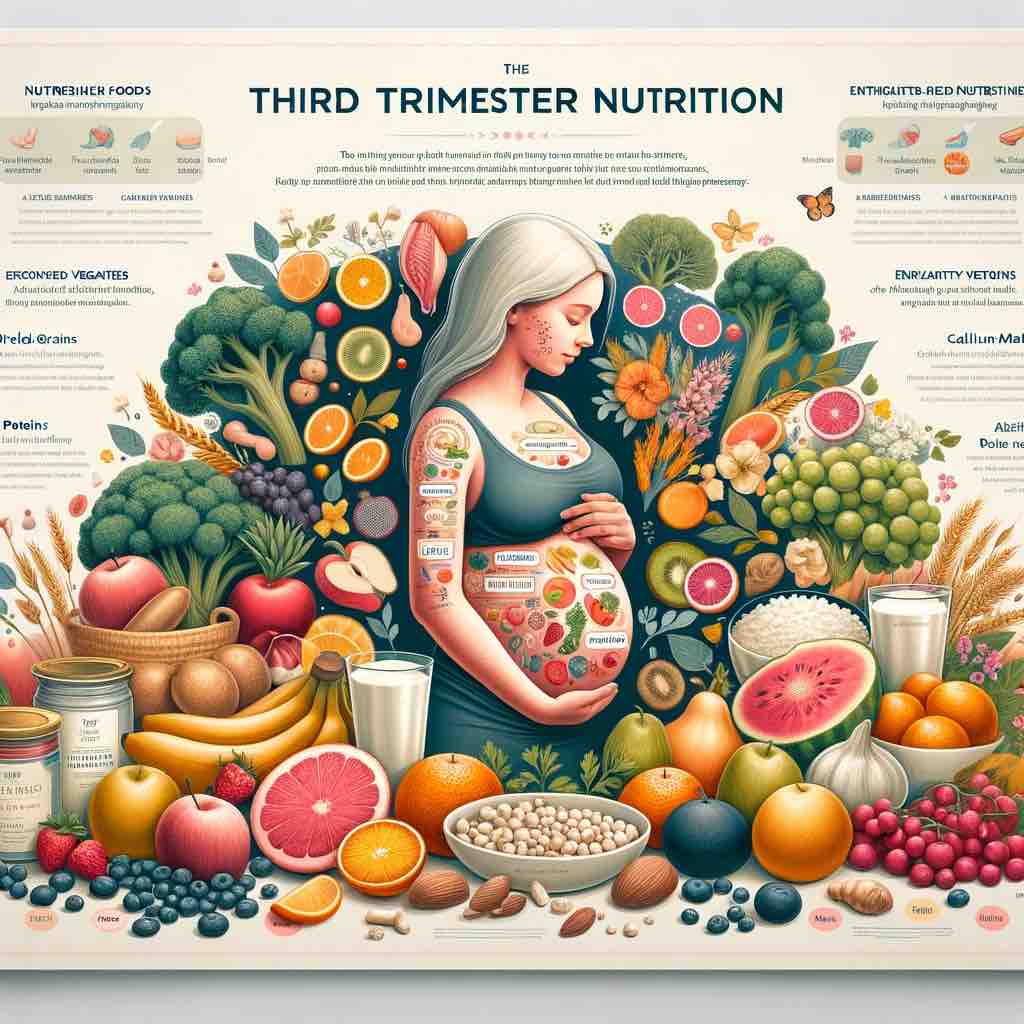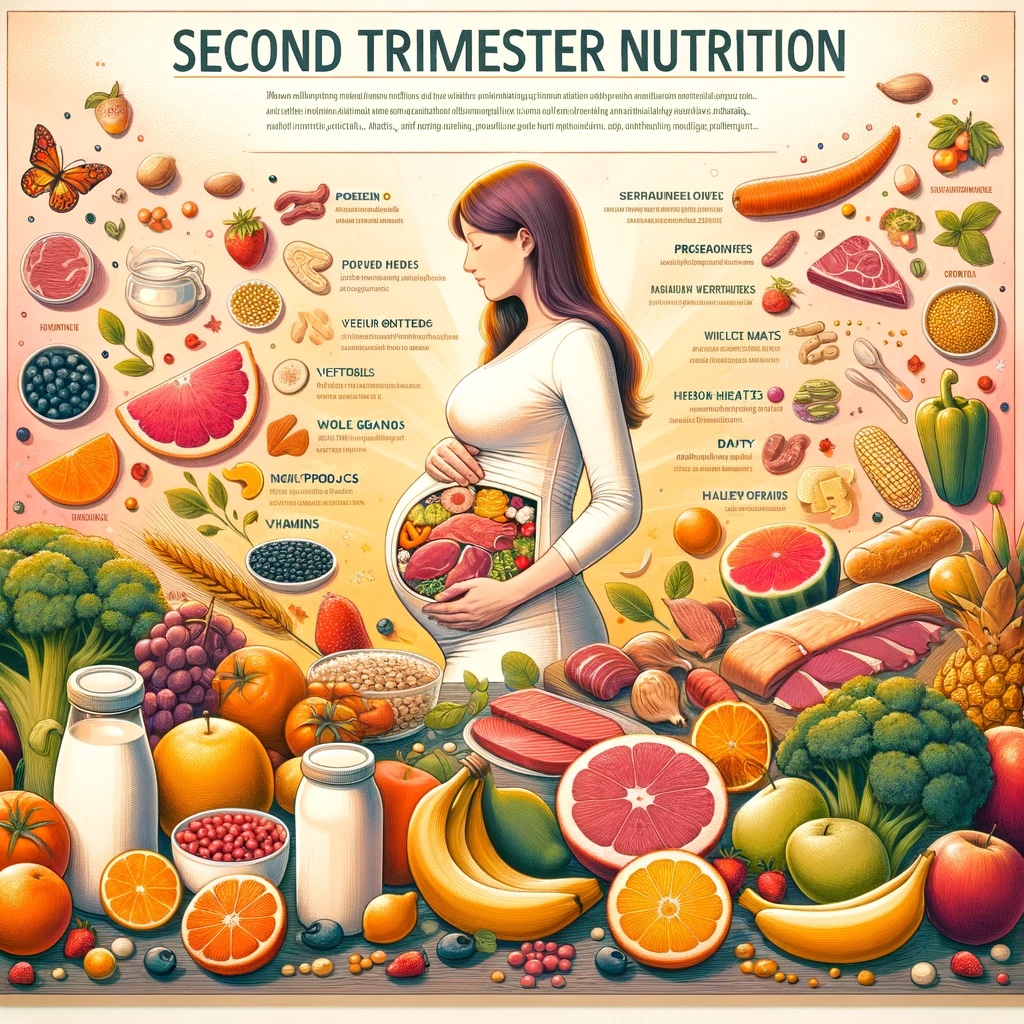
Embarking on the Third Trimester
Welcome to the final stretch of your pregnancy journey – the third trimester. This period is crucial for the baby’s final development and preparing your body for childbirth and postpartum recovery. Proper nutrition during these last few months is more important than ever. Let’s dive into the specific nutritional needs and strategies to support you and your growing baby.
Nutritional Priorities for the Third Trimester
- Increased Caloric Intake: Your energy needs are at their peak. You may need an additional 450-500 calories per day. Choose nutrient-rich foods that provide energy and support fetal growth.
- Protein: Essential for the baby’s continued growth, especially the brain. Maintain a high-protein diet with lean meats, fish, eggs, dairy, legumes, and tofu.
- Iron: Crucial for supporting increased blood volume and preventing anemia. Continue focusing on iron-rich foods and consider supplementation if recommended by your healthcare provider.
- Calcium and Vitamin D: Vital for the baby’s bone development. Dairy products, fortified plant-based milks, and leafy greens are excellent sources. Safe sun exposure can also help with vitamin D synthesis.
- Omega-3 Fatty Acids: Especially DHA, are critical for the baby’s brain and eye development. Fatty fish, flaxseeds, and walnuts are great sources.
- Fiber: Helps combat constipation, a common issue in the third trimester. Whole grains, fruits, vegetables, and legumes should be staples in your diet.
- Hydration: Increased blood volume and preparation for breastfeeding necessitate higher fluid intake. Aim for at least 8-10 glasses of water a day.
Managing Common Third Trimester Challenges
- Gestational Diabetes: Continue monitoring blood sugar levels. Focus on a diet rich in fiber and low-glycemic-index foods.
- Heartburn and Indigestion: Smaller, more frequent meals can help, as can avoiding spicy and fatty foods.
- Shortness of Breath: As your uterus expands, it can press against your diaphragm, causing shortness of breath. Eating smaller meals can help alleviate discomfort.
Preparing for Breastfeeding
- Nutrient Stores: Building up nutrient stores in preparation for breastfeeding is crucial. Focus on a balanced diet rich in all essential nutrients.
- Hydration: Adequate hydration is vital for milk production. Continue focusing on drinking plenty of fluids.
Final Preparations
- Nutrient-Rich Diet: Emphasize a diet rich in vitamins, minerals, and antioxidants. Include a variety of fruits, vegetables, whole grains, lean proteins, and healthy fats.
- Regular Physical Activity: Gentle exercises like walking or prenatal yoga can improve circulation, boost mood, and enhance stamina for childbirth.
Mental and Emotional Well-being
- Relaxation Techniques: Practices like meditation, deep breathing, or prenatal yoga can help manage stress and prepare you mentally for childbirth.
- Support Network: Stay connected with your support network. Sharing experiences and discussing concerns can be incredibly beneficial.
Consultation and Personalization
It’s essential to continue regular check-ins with your healthcare provider to address any nutritional or health concerns as your due date approaches.
Looking Ahead: Post-Pregnancy Nutrition
In our next post, we’ll explore post-pregnancy nutrition, focusing on recovery, breastfeeding (if chosen), and transitioning back to a regular diet. Stay tuned as we guide you through these final stages of pregnancy and into the postpartum period, ensuring a healthy and smooth transition for you and your baby.
FAQs for Third Trimester Nutrition
1. How many extra calories do I need in the third trimester?
- In the third trimester, you generally need an additional 450-500 calories per day. These should come from nutrient-dense foods to support your baby’s final growth phase and your body’s preparation for birth.
2. What are the best sources of protein during this trimester?
- Excellent protein sources include lean meats, poultry, fish, eggs, dairy products, legumes, and tofu. These help support the continued growth of your baby, especially their brain development.
3. Is it normal to experience heartburn, and how can I manage it?
- Yes, heartburn is common due to hormonal changes and the baby pressing against your stomach. Eating smaller, more frequent meals and avoiding spicy or fatty foods can help.
4. Why is iron important in the third trimester, and what are good sources?
- Iron is vital for supporting increased blood volume and preventing anemia. Good sources include red meat, poultry, fish, lentils, spinach, and iron-fortified cereals.
5. How can I ensure I’m getting enough Omega-3 fatty acids?
- Include foods like fatty fish (salmon, sardines), flaxseeds, chia seeds, and walnuts in your diet. These are rich in Omega-3s, crucial for your baby’s brain and eye development.
6. What should I do to prepare for breastfeeding nutritionally?
- Focus on a balanced diet to build nutrient stores and stay well-hydrated, as these are essential for milk production and recovery post-birth.
7. How much water should I drink in the third trimester?
- Aim for at least 8-10 glasses of water a day. Adequate hydration is key for increased blood volume and preparing for breastfeeding.
8. Are there specific exercises recommended for the third trimester?
- Gentle exercises like walking, swimming, or prenatal yoga are recommended. They can improve circulation, enhance mood, and build stamina for childbirth.
9. What role does fiber play in my third-trimester diet?
- Fiber helps combat constipation, a common issue during the third trimester. Incorporate whole grains, fruits, vegetables, and legumes into your diet to ensure adequate fiber intake.
10. How can I manage my mental and emotional well-being during this trimester?
- Engage in relaxation techniques like meditation, deep breathing, or prenatal yoga. Also, maintain a strong support network to discuss any concerns or share experiences.
Blog Tags for the Post
pregnancy nutrition, third trimester, fetal development, healthy eating, pregnancy diet, maternal health, breastfeeding preparation, gestational diabetes management, prenatal exercise, emotional well-being in pregnancy













